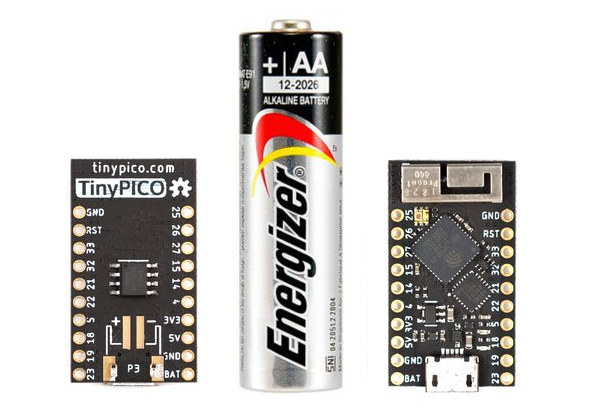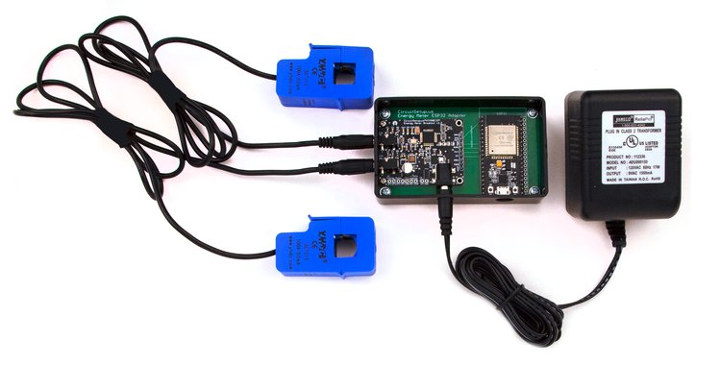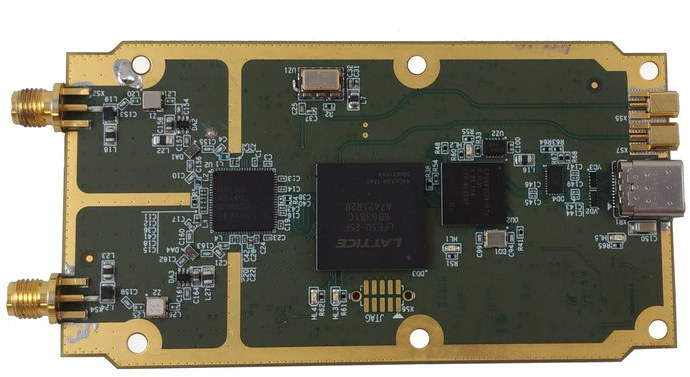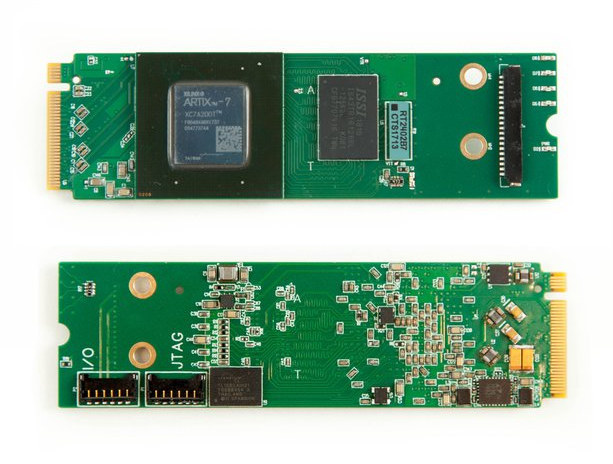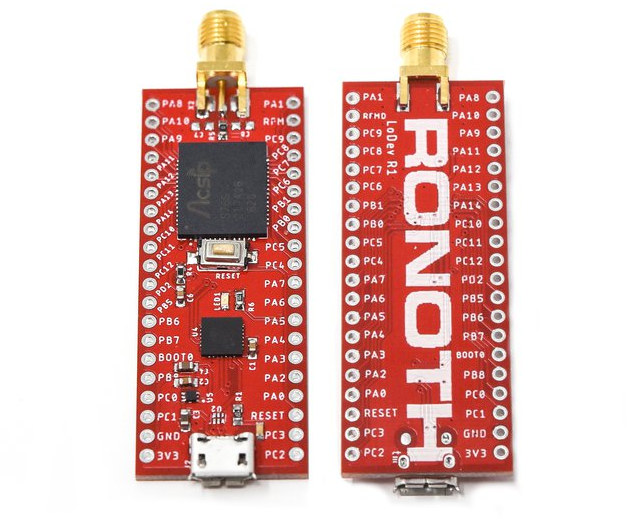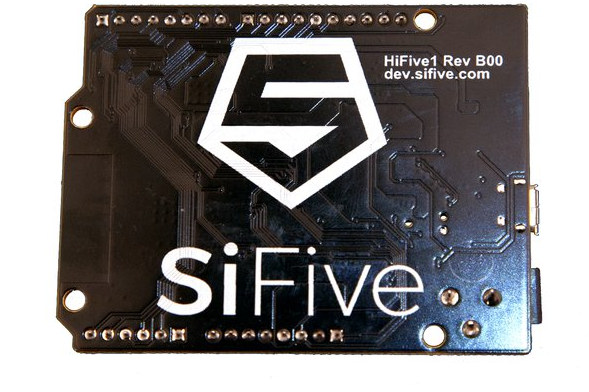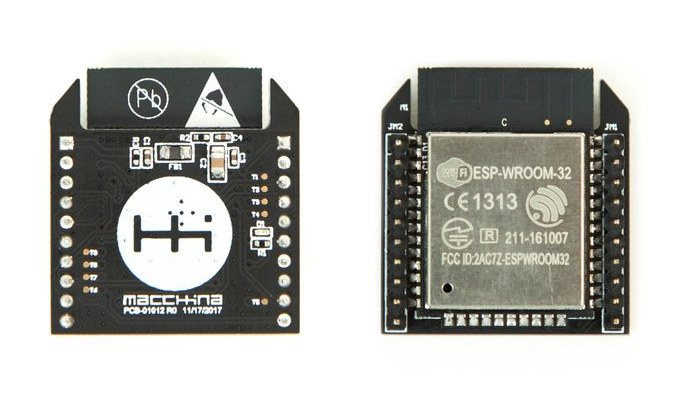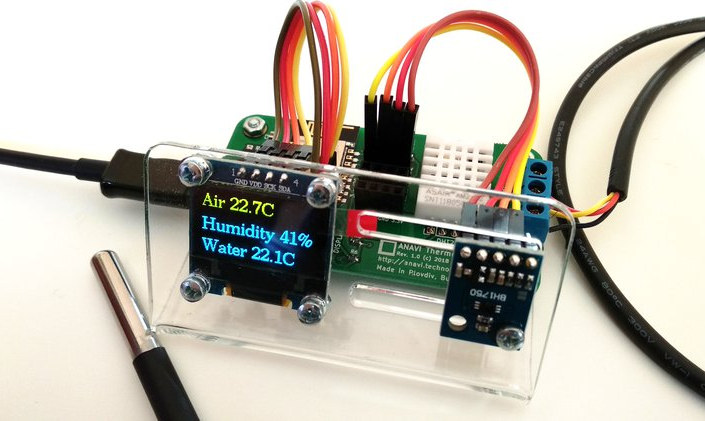There are so many ESP32 boards available now, so why bother with another ones. Some of the key selling points of TinyPICO are that it is really small at 32 x 18 mm, it’s easy to use out of the box with MicroPython firmware pre-loaded, and supports LiPo batteries with an optimized power path for low-power battery usage. The developer, named Unexpected Maker, also provides various shields for TinyPICO adding a display, sensors, an audio amplifier, an RTC, Grove headers, and more. TinyPICO board specifications: System-in-Package – Espressif Systems ESP32-PICO-D4 SiP with ESP32 dual-core processor operating at 240 MHz, 4 MB SPI flash External System Memory – 4 MB PSRAM Connectivity – 2.4 GHz WiFi 4 802.11b/g/n, Bluetooth 4.2 LE, 3D antenna Expansion – 14x GPIO broken out to standard pitch headers Debugging / Programming – USB + serial/UART for programming Misc – Power (red) & charge (orange) LED’s, APA102 […]
Split Home Energy Meter Combines ESP32 with Microchip ATM90E32 IC (Crowdfunding)
It’s always useful to monitor the electricity consumption of your house, as you can easily and quickly find out whether an appliance is suddenly consuming a large amount of electricity before finding out from your next utility bill. It can also help remotely monitoring if an appliance has stopped working and fix it as soon as possible, for example an electric pipe heater making sure your pipe do not freeze in a holiday home. In many cases, a qualified electrician needs to be involved for the installation of whole home energy meters both for safety and insurance matters. We’ve seen in the past energy meters fit easily into a circuit breaker box but they may not be suitable for all setups. I’ve previously reviewed an inexpensive digital clamp meter that you just need to clip on one of the wire connected to your home without having to mess with dangerous […]
Amungo NUT2NT+ is an Open Source High Precision GNSS Board (Crowdfunding)
Amungo Navigation NUT2NT+ is an open-source hardware four-channel, all-frequency, GNSS RF-to-bits receiver for precision, satellite-based positioning. Connected to the right antennas, the board can achieve centimeter positioning resolution by connecting to multiple navigation satellite systems including GPS, GLONASS, Galileo, BeiDou, and IRNSS. Amungo claims that while several startups and large companies already offer proprietary GNSS positioning solutions NUT2NT+ is the only open source option in this class of GNSS devices. NUT2NT+ key features and specifications: Receiver chip – NTLab NT1065 4-Channel RF Front-End IC FPGA – Lattice ECP5 with 12K LUTs + 28 DSP blocks (LFE5U-12) opened for custom design USB – 1x USB 3.1 Type-C port via CYUSB3014 USB 3.0 controller: Clock – 10 MHz TCXO, soldered RF inputs – 2x bands dedicated; – 5 dB referred noise floor ADC – 2-bit resolution up to 99 MHz Samples transfer – Continuous full stream, from 10 to 50 Mbytes/sec GNSS […]
NiteFury Puts Xilinx Artix-7 FPGA into an M.2 Card (Crowdfunding)
NiteFury is an FPGA development board, but it works differently than most, as RHS Research LLC put a Xilinx Artix-7 FPGA into an M.2 Key M card that you can easily insert into a laptop or mini PC with a 80mm M.2 socket. The board also includes DDR3 memory, and exposes a few configurable I/Os. You can use NiteFury to experiment with Xilinx PCIe IP, but also as FPGA co-processor for example to handle encryption, and encoding/decoding data. NiteFury card specifications: FPGA – Xilinx Artix XC7A200T-2FBG484E delivering up to ~1000 GMAC/s, with 215,360 Logic cells, 33,650 Slices, 269,200 CLB flip-flops, and 740 DSP slices. System Memory – 8 Gbit DDR3 (512 MB x 16) Host Interface – PCIe 4x gen 2 (2 Gb/s) External I/Os Via I/O connectors – 12x I/O including 4x selectable analog or digital – JTAG ready Via PCIe connector – 1x 3.3 V digital I/O (LED), […]
LoDev S76S Board Combines STM32, LoRa and Arm Mbed Support (Crowdfunding)
There are already plenty of low power boards with a LoRa radio, but Ronoth offers another option with their tiny LoDev S76S LoRa development board featuring AcSip S76S SiP (system-in-package) with STMicro STM32L073 microcontroller, a Semtech SX1276 LoRa radio, and other components. While most hobbyist LoRa boards are designed to be programmed with the Arduino IDE, LoDev S76S is instead compatible with Arm Mbed. LoDev S76S board specifications: SiP – AcSip S76S system-in-package with STMicro STM32L073 Arm Cortex-M0+ microcontroller @ 48 MHz with 192 kB flash, 20 kB RAM Semtech SX1276 chip supporting global 863MHz ~ 928MHz ISM Bands RF front-end LoRa Connectivity Receiver Sensitivity – down to -146 dBm TX Power – adjustable up to +20 dBm Range – up to 15 km coverage in suburban areas and up to 5 km coverage in urban areas SMA antenna connector USB – 1x micro USB port for programming and power […]
HiFive1 Rev B Board Gets FE310-G002 RISC-V Processor, WiFi & Bluetooth Module
SiFive launched what may have been the very first RISC-V development board in 2016 thanks to their HiFive1 Arduino compatible board powered by Freedom E310 (FE310) open source RISC-V processor. The company has now launched an upgrade version of the processor and board. Meet FE310-G002 processor and HiFive1 Rev B development board. HiFive1 Rev B development board specifications with new features highlighted in bold or stricken-through: MCU – SiFive Freedom E310-G0002 32-bit RV32IMAC processor @ up to 320+ MHz (1.61 DMIPS/MHz) Storage – 32 Mbit SPI flash (was 128 Mbit in the first version) Connectivity – ESP32-SOLO-1 WiFi & Bluetooth module I/Os 19x Digital I/O Pins 19x external interrupt pins 1x external wakeup pin 9x PWM pins 1/3 SPI Controllers/HW CS Pins I/O Voltages – 3.3V or 5V supported; note: bidirectional level shifters removed so FE310-G002 can drive the I/O pins directly at 3.3V only. USB – 1x micro USB […]
SuperB XBee Compatible Module Features ESP32 WiFi & Bluetooth SoC (Crowdfunding)
Digi XBee is an ecosystem of standardized wireless module found in various development boards, and Espressif Systems ESP32 is by far the most popular WiFi and Bluetooth solution in the maker market. Somebody designed ESP32Bee combining ESP32 with XBee form factor a couple of years ago, but it was never commercialized, and I’m not aware of alternatives, except for SuperB module based on ESP32-WROOM-32 module that has just launched on Crowd Supply. SuperB modules specifications: Wireless Module – ESP32-WROOM-32 with ESP32 dual core WiSoC clocked at up to 240 MHz 4MB flash (potentially upgraded to 16MB) Connectivity – 802.11 b/g/n WiFi, and Bluetooth Classic + LE Expansion – 3.3 V levels, UART, SPI and GPIOs broken out to headers Misc – 1x user LED Power Consumption – Sleep current is less than 5 μA Dimensions – XBee form-factor compatible Certifications – Fully certified with integrated antenna and software stacks The […]
ANAVI Thermometer WiFi Board is Designed for Home Automation (Crowdfunding)
ANAVI Technology launched several open source hardware boards for the Raspberry Pi and ESP8266 maker communities in the past, starting with RabbitMax Flex home automation HAT for Raspberry Pi, and several others including ANAVI Light Controller ESP8266 board to control LED strips. All boards are designed with KiCad opensource EDA software, and I’ve tested several already such as ANAVI Infrared pHAT or ANAVI Light Controller, and found documentation to be very good and easy to follow. The company has now launched another ESP8266 board with ANAVI Thermometer that allows you to monitor temperature and humidity, effectively acting as a thermostat for home automation. ANAVI Thermometer specifications: SoC – Espressif Systems ESP8266 Tensilica L106 32-bit processor Connectivity – WiFi 802.11 b/g/n Display – Mini OLED display Build-in sensor – AM2302 (DHT22) temperature and humidity sensor Expansion Terminal block for DS18B20 waterproof temperature sensor UART pins 3x slots for I2C sensors Misc – […]


